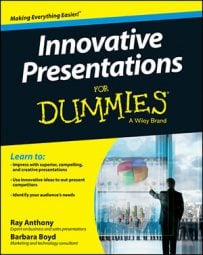Although more of a technique to enhance content instead of a type of content; such as the innovative presentation, rhetorical questions create anticipation, curiosity, and suspense for what follows. A rhetorical question poses a query without expecting an answer. It creates curiosity, anticipation, or even suspense and gets your audience thinking about the question you just asked.
Say you have skeptics in your audience who don’t believe using your company’s new manufacturing and assembly process is a good idea because of disruptions in the changeover due to training time, halted production, and poor return on investment.
In this example, after your introduction, but before you get into the brief process overview, set the stage with several rhetorical questions that have a touch of devil’s advocate in them to get people thinking:
Your current process has been very successful for so long. That’s a great testimony to your accomplishments! But nothing stands still for long. Your competitors are biting at your heels to knock you out of the lead position in your industry by implementing significant innovations to make their operations more productive, more efficient, more accurate, and higher quality.
Can you afford to let them do that at your expense? Of course not!
Why change right away and go with our comprehensive fabrication and assembly process when others are less costly and take less time to install and start operating?
Aren’t you going to get hassles and disruptions in changing over to our new integrated system with the complexities you perceive it having?
How can you know for sure you’ll get rapid payback and a return on investment that you’ll be proud of?
Say something to the effect to of, “In the next 45 minutes, let’s explore solid answers to those questions, which anyone in your position would naturally have. I say this with a sense of confidence and assuredness: You will be surprised and, I believe, quite pleased with what you hear during our presentation!”
Asking those tough rhetorical questions without expecting answers will pique the audience’s curiosity as to how you’ll answer them, which means you will have their full attention and can then earn their interest and acceptance.

